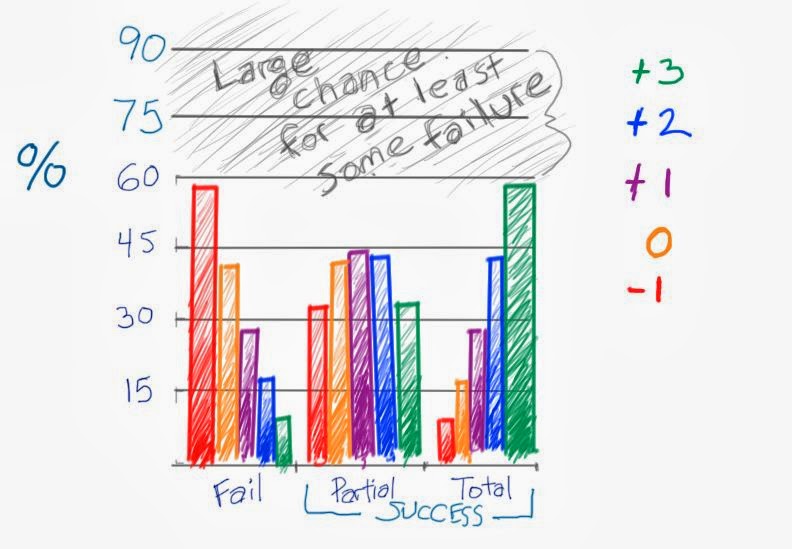
As I’m getting used to Dungeon World, I drafted up a chart showing the probability of outcomes based on your bonus (+3 to -1) and it reinforces my latest epiphany around when to call for dice rolls. If you even suspect they should just be able to do something, let them do it without a roll.
Rolls don’t represent your chance to do something the way they do in other games – I would think of it in the inverse – they are the chance that something untoward happens.

once I did this: http://apocalypse-world.com/forums/index.php?topic=2787.msg16696#msg16696
Moves represent a lot of things! It’s hard to pin them down to success / failure. Basically what they do is help the GM add complications that make the story interesting without having to be like “um, this bad thing happens to you!” arbitrarily and feel men for it. Now he can say, “okay roll the dice for that… uh-oh, that means this bad thing happens to you!” Now it’s the dice’s fault. Nobody will blame him as a person for the bad result.
You roll when a move is triggered. When the trigger condition on the moves is met. Probability or anything else never has something to do with it.
My point is that sometimes the player does not have to make a move – they simply succeed. Even when they are doing something that would normally call for a move, the DM needs to assess whether or not there is over a 40% chance that it could trigger a GM move.
No they don’t have to
That goes against the agenda for saying what the rules demand. When you trigger a move I have to tell you and you have to roll. Why would you know what the chances of an action are? Play to find out!
There are examples in the rules of hand waving a move roll in favor of the fiction.
Can you give me the example?
Page 59 second example under Hack and Slash. No move roll, just deal damage.
That is because the character isn’t engaging the orcs in melee but attacking from hiding. The first would trigger HS,mother second doesn’t.
Note that this is just about the trigger. The same way you can’t engage a dragon in melee by stabbing at it with a dagger. You would need to go for its weak spot that you know about or a magic dragon slaying dagger.
So in other words: the fiction trumps the move rule.
No. They are the same thing. There is no move without some fiction and no fiction triggers of moves that not trigger the move. They are inherently interconnected.
That is why you roll every time you cast light for example.
Okay – thanks Tim.
hey, he is telling the truth! 😛 Hack’n’slash it’s not a to-hit roll that you can skip because the gm decides you shouldn’t fail. Hack’n’slash is a move you roll when you engage in actual melee an actual enemy. It’s not that the fiction trumps it, it’s just that it didn’t trigger it.
In other words, it’s not that the gm decides to roll if he thinks something is interesting. Decision on what to roll is most often up to the gm, but he has to follow the established fiction. If a player, during the starting Q&A, said that dragons are horse-sized mindless predators, then sure you can hack’n’slash them.
This obviously goes for every move.
Okay – helpful. Not so much that fiction trumps moves and more that fiction can dictate if a move is triggered. So in that example on page 59 the move is not triggered – same is true with the example at the bottom of that page.
Absolutely. Even better, the fiction it’s the only thing that dictates whether a move is triggered or not! And as Sage said in his blog, <“The fiction” is essentially short for “the fictional world that everything happens within.”>
Remember that failed rolls also award XP. If you survive it, your character learns things and become better/awesomer. In DW failure generates tension and advances the fiction. Failure is good. If you try to reduce the times players roll because they may fail, you take a lot of wind out of the system. If you are finding the failures are too lethal, remember that you have a lot of latitude for many results for soft moves that aren’t just dealing damage. Use those moves to crank the tension and advance the fiction.